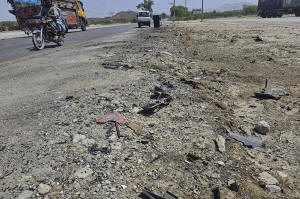A suicide car bomber strikes a school bus in southwestern Pakistan,
killing 5 people
[May 21, 2025]
By ABDUL SATTAR and MUNIR AHMED
QUETTA, Pakistan (AP) — A suicide car bomber struck a school bus in
southwestern Pakistan on Wednesday, killing five people — including at
least three children — and wounding 38 others, officials said, the
latest attack in tense Balochistan province.
The province has been the scene of a long-running insurgency, with an
array of separatist groups staging attacks, including the outlawed
Balochistan Liberation Army, or BLA, designated a terror group by the
United States in 2019.
A local deputy commissioner, Yasir Iqbal, said the attack took place on
the outskirts of the city of Khuzdar as the bus was taking children to
their military-run school there.
Troops quickly arrived at the scene and cordoned off the area while
ambulances transported the victims to hospitals in the city. Local
television stations aired footage of the badly damaged bus and scattered
debris.
No group immediately claimed responsibility for the attack but suspicion
is likely to fall on ethnic Baloch separatists, who frequently target
security forces and civilians in the region.
Pakistan’s Interior Minister Mohsin Naqvi strongly condemned the attack
and expressed deep sorrow over the children’s deaths. He called the
perpetrators “beasts” who deserve no leniency, saying the enemy had
committed an act of “sheer barbarism by targeting innocent children.”

Officials, who initially reported that four children were killed but
later revised the death toll to say two adults were also among the dead,
said they fear the toll may rise further as several children were listed
in critical condition.
Blaming India
The military also issued a statement, saying the bombing was “yet
another cowardly and ghastly attack” — allegedly planned by neighboring
India and carried out by "its proxies in Balochistan.”
There was no immediate comment from New Delhi.
Most of the attacks in the province are claimed by the BLA, which
Pakistan claims has India's backing. India has denied such claims.
Prime Minister Shehbaz Sharif expressed his condolences and also blamed
India, without providing any evidence to support the claim.
“The attack on a school bus by terrorists backed by India is clear proof
of their hostility toward education in Balochistan,” Sharif said, vowing
that the government would bring the perpetrators to justice.

[to top of second column]
|

A motorcyclist and vehicles drive past the site of suicide bombing
at a highway on the outskirts of the city of Khuzdar, in
southwestern Pakistan, Wednesday, May 21, 2025. (AP Photo)

Later, Sharif's office said he is traveling to Quetta, the capital
of Balochistan, along with Field Marshal Asim Munir, to meet with
the victims of the attack, and to receive a briefing.
Pakistan regularly accuses India, its archrival, for violence at
home. These accusations have intensified in the wake of heightened
tensions between the two nuclear-armed nations amid a cross-border
escalation since last month over the disputed Himalayan region of
Kashmir, divided between the two but sought in its entirety by each.
That escalation raised fears of a broader war, and during this
period the BLA appealed to India for support. India has not
commented on the appeal.
A vicious insurgency
Though Pakistan’s largest province, Balochistan is its least
populated. It’s also a hub for the country’s ethnic Baloch minority,
whose members say they face discrimination by the government.
In one of its deadliest recent attacks, BLA insurgents killed 33
people, mostly soldiers, during an assault on a train carrying
hundreds of passengers in Balochistan in March.
And earlier this week, the BLA vowed more attacks on the “Pakistani
army and its collaborators” and says its goal is to "lay the
foundation for a peaceful, prosperous and independent Balochistan.”
Militant groups are also active in the Balochistan and though it is
unusual for separatists to target school children in the province,
such attacks have been carried out in the restive northwest and
elsewhere in the country in recent years.

Most schools and colleges in Pakistan are operated by the government
or the private sector, though the military also runs a significant
number of institutions for children of both civilians and of serving
or retired army personnel.
In 2014, the Pakistani Taliban carried out the country’s deadliest
school attack on an army-run institution in the northwestern city of
Peshawar, killing 154 people, most of them children.
___
Ahmed reported from Islamabad.
All contents © copyright 2025 Associated Press. All rights reserved |